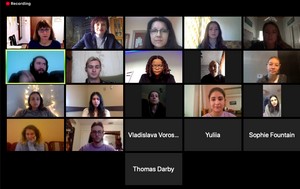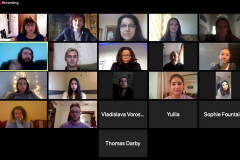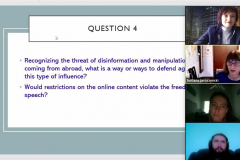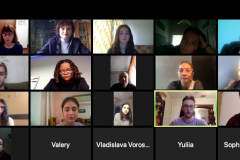On October 29, a video conference was held between students of the University of Florida (FSU) and students of the Gorlovka Institute of Foreign Languages. The idea of video communication came from GIIM associate professor Marina Shkuropat, who during her internship under the program named after In 2017, Fulbright visited the University of Florida in the United States with a lecture on the political situation in Ukraine and met with university professors. The idea was supported by Svitlana Yarozhynsky, a doctoral student at the University of Florida, who is teaching the course "Propaganda, Media, and FakeNews" at FSU this semester.
Given that GIIM has been a participant in the IREX media literacy project Learn to Discern for the second year in a row and a group of students took a five-week English media literacy training course last year, the two ERASMUS + projects have a component on media literacy - it is on their basis that new selective disciplines related to media literacy were developed - the topic for discussion was chosen "Modern forms of propaganda". In the preparatory phase, students from both schools were invited to read Masha Hessen's article "Why the Russian Influence Campaign Remains so Hard to Understand" (TheNewYorker, December 18, 2018), which analyzes hybrid forms of propaganda as a means of depriving adequate perception of reality. After that, American and Ukrainian students prepared questions for reflection on the content of the article, and the most interesting ones were selected for joint discussion. In particular, the following were chosen: Is it difficult for ordinary people to distinguish between information and propaganda that are designed to shape opinions and influence decisions? How not to fall into the trap of propaganda? How to protect yourself from the threat of manipulation and misinformation from the outside? Will the introduction of restrictions violate freedom of speech? How do Ukrainians / Americans perceive memes on social networks - more as a threat or entertainment? And can politically colored memes influence voters' political preferences?
After the exchange of views, some time was set aside for the exchange of general issues.
From the Ukrainian side the meeting was attended by: students of FSMK Borisenko O., Degtyareva A., Nechitaylo V., Voroshilova V., Tarasova Y., Rybalko P., Astakhov O. and students of FRGM Kucheruk V, Miroshnikova A., Dyachenko V. , as well as associate professors Shkuropat M.Yu. and Kontsur VV
Anyone who is interested can watch the video of the conference the following link:





